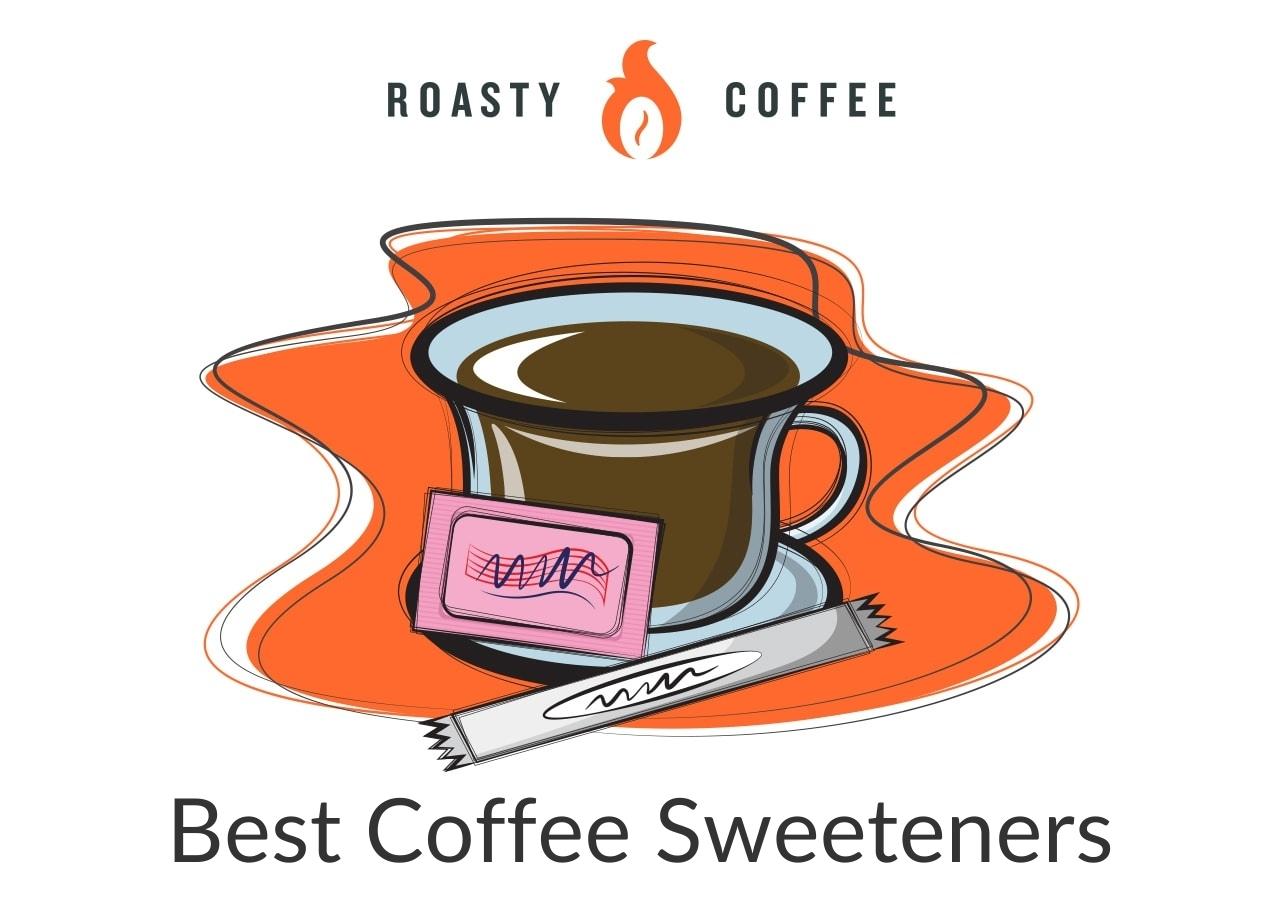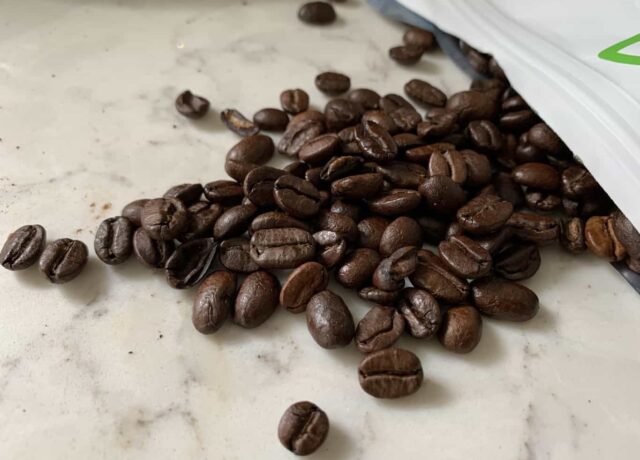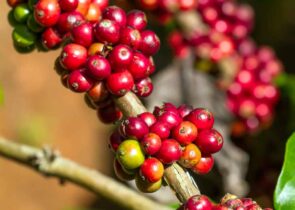
There are as many ways to dress up a cup of coffee as there are coffee drinkers. While some are stalwart black coffee fans, there are plenty of us who need a little sweetness in our java.
The right coffee sweetener depends on your health goals and preferences.
For health aficionados who want to avoid refined sugar and also keep their daily cup on the natural side, we’ve put together a list of natural sweeteners and their possible health benefits. You can feel good about your sweet tooth with these options.
If you want or need to avoid the calories of sugar, we also have some ideas for you. Artificial sweeteners and zero-calorie sweeteners provide the sweetness without the calories.
Refined Sugar- White, Brown, and Raw
White Sugar
The most common sugar used by coffee drinkers. This processed sugar comes in many forms, but you’re most likely to find white granulated sugar on a coffee bar.
Brown Sugar
Brown sugar offers a heavier flavor than white sugar and is made by adding molasses back to the sugar during processing. This makes brown sugar heavier, moister, and more prone to clumping.
Adding molasses back into the brown sugar technically adds a small amount of minerals, but the difference is so slight that brown sugar is really no healthier than white sugar.
Raw Sugar
Raw sugar, like white sugar, is made by refining sugar cane. It is less processed than white sugar and has slightly more minerals than white sugar. The difference, though, is again quite minor.
Raw sugar typically comes in larger granules and can be more difficult to dissolve into a beverage than white table sugar.
Raw sugar is also referred to as turbinado sugar.
Should I Avoid Sugar?
White sugar is a common coffee sweetener, but there are health risks associated with consuming sugar.
Excessive refined sugar intake is linked to type 2 diabetes, obesity, heart disease, and liver disease. It has also been linked to a higher risk of cancer and depression.
Because of these risks, many coffee drinkers turn to natural sugar alternatives or artificial sugar substitutes.
Natural Substitutes For Sugar
Many consumers want to limit the added sugar in their diet. Artificial and natural alternatives to sugar are available, but health-conscious consumers increasingly choose more natural products.
There are a variety of natural sweeteners on the market. Some are much sweeter than regular sugar, offering a lower caloric intake, while others are not low-calorie but offer other possible health benefits.
Heath Benefits of Natural Sweeteners
The potent sweetness of some natural sugar substitutes allows the consumer to use much less. People trying to lose weight or control their sugar intake for health reasons might choose to add these popular sweeteners to their coffee to reduce added calories.
Some natural sugar substitutes don’t cause a spike in blood sugar. Diabetics might reach for these sweeteners when making their cup of joe.
There are also some natural sweeteners, like maple syrup, that still contain calories and still cause spikes in glucose levels. However, they may offer health benefits, such as antioxidants, that wouldn’t be found in plain sugar.
Natural Sweeteners to Try
Erythritol
Erythritol is a sugar alcohol. It is made when glucose from wheat or corn is fermented. It has 70% of the sweetness of sugar, but only 6% of the calories. This makes it a great choice for anyone trying to reduce calorie intake.
It also doesn’t spike glucose levels, making it safe for diabetics.
Erythritol has been found to be safe for both humans and animals to consume. It’s also easier to digest than other sugar alcohols.
Stevia
Stevia is a natural, no-calorie sweetener extracted from the South American stevia plant. This extract is 300 times sweeter than sugar, but it does not have the same effect on blood sugar levels, meaning it is a great sweetener option for diabetics.
Studies have shown that regular use of stevia may lower systolic and diastolic blood pressure in those with high blood pressure. It also has antioxidant properties and is considered anti-inflammatory.
Monk Fruit
Monk fruit sweeteners are made from the luo han guo fruit, also known as the monk fruit, a small fruit that grows in southern China. The juice extracted from this fruit has no calories and is up to 200 times sweeter than sugar.
Monk fruit sweeteners do not promote tooth decay and are safe for people with diabetes. It is also considered to have anti-inflammatory properties.
Honey
Honey contains more calories than sugar. However, it also tastes sweeter than sugar, so people may feel they don’t need to add as much to their daily cup of coffee.
On top of that, raw honey contains many vitamins and minerals that your body needs such as magnesium, potassium, and various B vitamins. Honey is also an antioxidant and even acts as an anti-fungal and anti-bacterial agent and has been shown to even aid in digestion.
Maple Syrup
Another of nature’s sweeteners, maple syrup can help you sweeten that hot cup of coffee while also improving your health. Researchers have found that maple syrup contains the same antioxidant compounds found in berries.
It’s important to be sure you purchase all-natural syrup, as the artificial versions contain none of these benefits. Maple syrup contains calories and can contribute to weight gain.
Coconut Sugar
Coconut sugar is made from the sap of the coconut palm tree. It contains minerals such as calcium, zinc, and iron and is often considered a healthier option than table sugar for this reason.
However, it’s important to note that coconut sugar still contains calories and still spikes blood sugar, so it’s not a great choice for diabetics or anyone whose goal is weight loss.
Agave Syrup
Agave syrup is a sweetener produced from the blue agave plant. It is a natural alternative to sugar and is vegan-friendly. It also dissolves well into hot beverages.
Agave has a higher calorie count than table sugar. It has a low glycemic index, but can still cause a spike in blood sugar and is therefore not a good choice for diabetics.
Artificial Substitutes For Sugar
Are Artificial Sweeteners Healthy?
While some consumers are reaching for natural options, artificial sweeteners have been a low-calorie staple for many years.
There are five artificial sweeteners approved by the FDA, and three of them, sucralose, aspartame, and saccharin, are common on many coffee bars. The safety and health of these sweeteners have long been debated.
Reducing Sugar Intake
The American Heart Association and American Diabetes Association recommend using artificial sweeteners to help reduce daily sugar intake. However, they caution against using these sweeteners as an excuse to make other poor diet choices.
There is also some concern that frequently using artificial sweeteners, which are much sweeter than sugar, can cause less sweet or unsweet foods, like fruits and vegetables, to taste worse by comparison. This could lead to overall worse diet habits.
Artificial sweeteners can be a great overall option for anyone trying to reduce sugar intake, it’s just important to use moderation.
Cancer Concerns, Debunked
It’s also common to hear concerns that artificial sweeteners cause cancer. In early studies, saccharin was linked to bladder cancer in lab rats. However, more recent studies have not shown it to be carcinogenic in humans and saccharin was removed from the list of possible cancer-causing substances in 2000.
Aspartame and sucralose have similarly been shown in studies to be safe for consumption and not cancer-causing.
Artificial Sweeteners to Try
Sucralose
Sucralose is an artificial sweetener made through the chlorination of sucrose. Sucralose is 600 times sweeter than sugar. Because it’s so sweet, it is bulked up with dextrose so that it can be sold and used as a closer substitute for sugar.
A common brand name for sucralose is Splenda.
Aspartame
Aspartame is a fully artificial product made from amino acids. It’s around 200 times sweeter than sugar. It does contain calories, but because it is so sweet, consumers only need to use a tiny amount.
You can find aspartame for table use under brand names like NutraSweet and Equal.
Aspartame has been studied exhaustively and found to be safe, except for people with the rare hereditary disease phenylketonuria (PKU).
Saccharin
No products found.
Saccharin is 200 to 700 times sweeter than natural sugar but contains no calories. Like sucralose, it is diluted with dextrose for table use.
Saccharin is commonly sold under the brand name Sweet N Low.
Some people find the very powdery texture of this sweetener to be unpleasant, and others find that it has a bitter aftertaste.
Zero-Calorie Sweeteners
Non-Nutritive Sweeteners
The FDA classifies sweeteners with less than 2% of the calories of sugar as non-nutritive sweeteners. There are eight of these sweeteners. The five that are commonly used as tabletop sweeteners, such as for coffee, are:
- Aspartame
- Sucralose
- Stevia
- Saccharin
- Monk Fruit Extract
Try one of these options if you want to sweeten your coffee without adding additional calories.
Zero-Calorie vs Low-Calorie Sweeteners
Monk fruit extract, stevia, sucralose, and saccharin are truly zero-calorie. Aspartame, on the other hand, is very low-calorie. In fact, a single packet (like you’d use in your coffee) doesn’t even contain one whole calorie and is therefore listed as having zero calories on the nutritional information.
Brewing Less Bitter Coffee
If you sweeten your coffee to avoid a bitter flavor, it’s possible your brewing routine needs a little tweaking.
While there’s nothing wrong with adding a little sweetener, these tips can ensure that your brew starts with the best possible flavor.
Grind Size
A grind size that is too fine can lead to bitter coffee, while too coarse might brew sour and acidic coffee. Try changing up your grind size and see if you prefer the flavor you get.
Check Your Beans
Stale beans won’t be flavorful and can also have a bitter flavor. Make sure your beans are fresh.
If freshness isn’t the problem, a lighter roast can provide a less bitter flavor than darker roasts.
Give Cold Brew a Shot
Cold brew coffee is known for a smoother, less bitter flavor than coffee brewed hot. You might find that coffees brewed this way are more your speed.
FAQS
Which sweetener tastes the most like sugar?
Most people find that erythritol tastes almost identical to sugar. Stevia is also a popular option, but since it’s so sweet, it can be easy to overdo it.
Is brown sugar healthier than white sugar?
Brown sugar does contain some minerals not present in white sugar, so it technically offers more health benefits. However, the difference is extremely minor.
Is raw sugar healthier than white sugar?
Raw sugar is slightly less processed than white sugar, but it has the same number of calories and no additional health benefits.
Which sweeteners are good for diabetics?
Sugar substitutes, including aspartame, sucralose, stevia, and saccharin, are all good choices for diabetics.
What is the best way to sweeten cold brew coffee?
To avoid crystals of undissolved sugar at the bottom of your cold brew, try making a simple syrup, or use a liquid sweetener like agave syrup or maple syrup.
A Sweet Cup For Everyone
No matter your flavor and health priorities, there is a sweetener that is right for you.
Natural options might be best for coffee drinkers who want to consume less processed products, while diabetics or people who are trying to lose weight might choose a zero-calorie or artificial sweetener.
Some traditionalists might even decide to stick with white sugar in moderation.
When you need to indulge your sweet tooth and also get your caffeine fix, we hope you’ll give one of these options a try.
Happy Sweetening!









